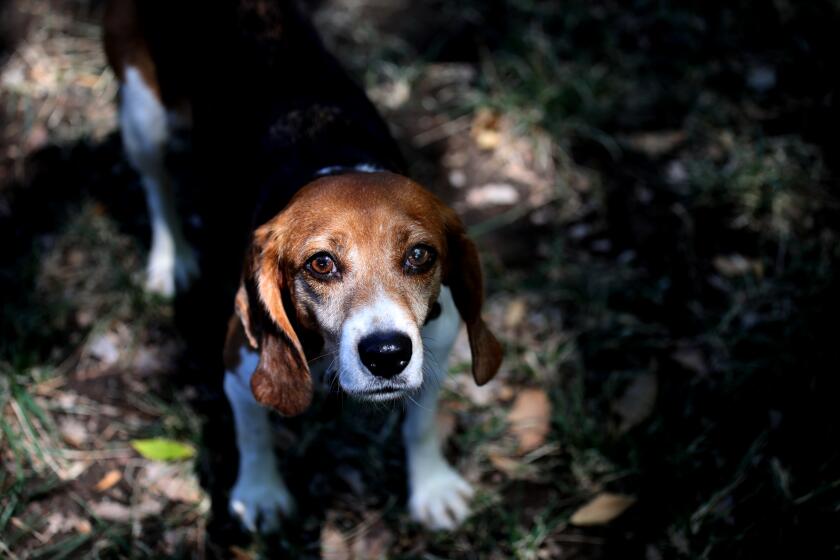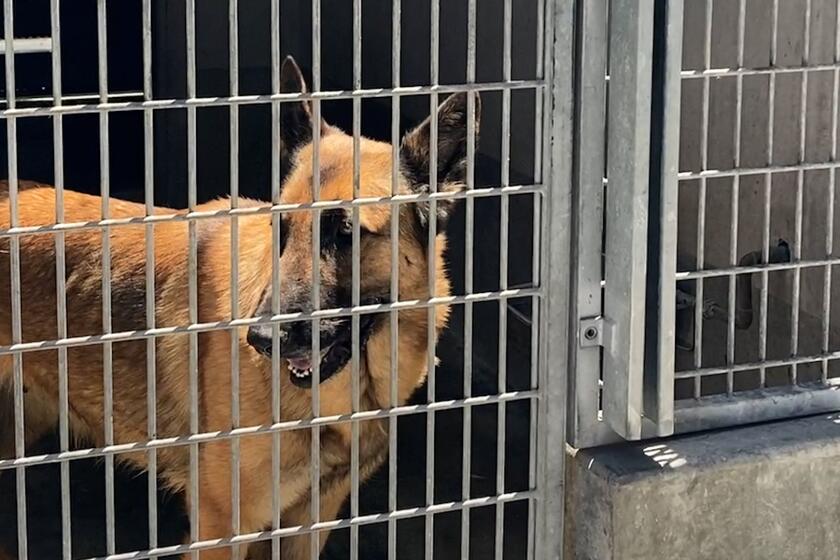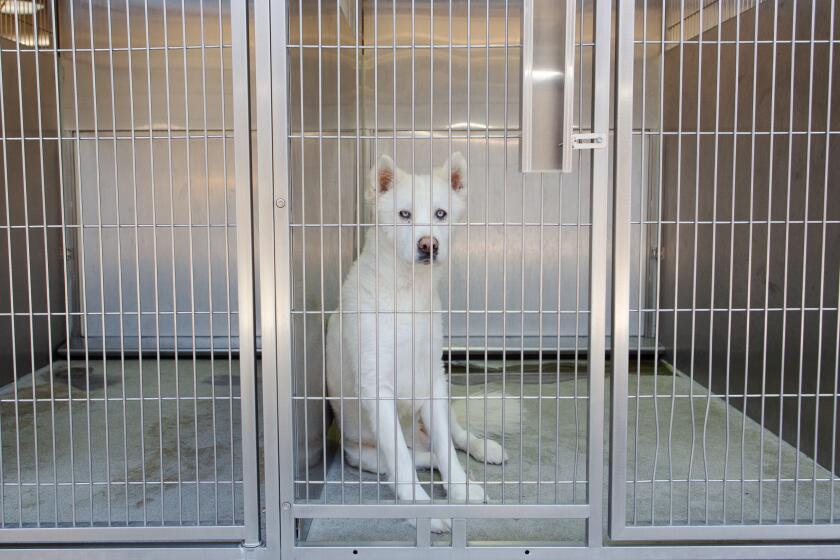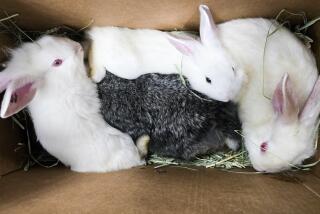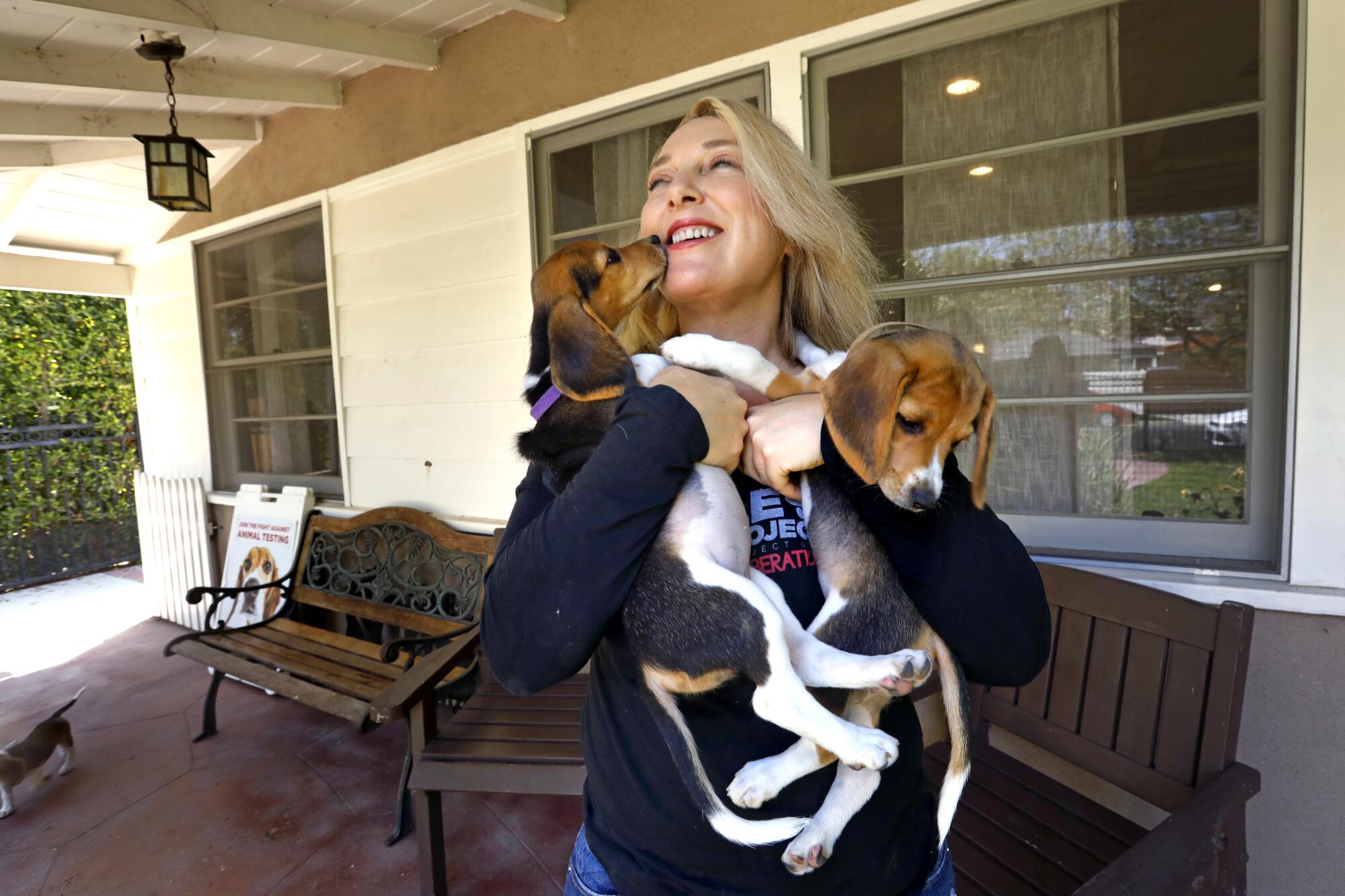
- Share via
In less than two months, Mamma Mia the beagle went from rags to royalty.
Her changed life began in July when federal authorities rescued her — along with 4,000 other beagles — from overcrowded and unsanitary conditions at the Envigo breeding and research plant in Virginia.
Her new home is a sprawling estate in Montecito, where the 7-year-old dog will roam around a lush 7-acre property.
Her new owners? The Duke and Duchess of Sussex.
“The duchess called me personally,” said Shannon Keith, an animal rights attorney who runs the Beagle Freedom Project out of the low-slung Valley Village house where she used to live. But Keith said that at first, she didn’t realize who the “VIP Donor” interested in a beagle adoption was.
“She calls on my cell with no Caller ID and says, ‘Hey Shannon, this is Meghan,’” said Keith, whose nonprofit organization rescues beagles and other dogs as well as cats, pigs, horses, rabbits, goats and sheep, most of which were used in laboratory testing. “We talked for 30 minutes, and I thought, ‘Is this Megan Fox?’”
But it was Meghan, the Duchess of Sussex, and her husband, Prince Harry, who made an after-hours visit to the unassuming San Fernando Valley house on Hartsook Street this month.
The royal couple’s spokeswoman confirmed the visit to The Times; neither commented on the adoption. It was a no-photos affair, with two security guards joining Meghan and Harry in their quest for a furry family member.
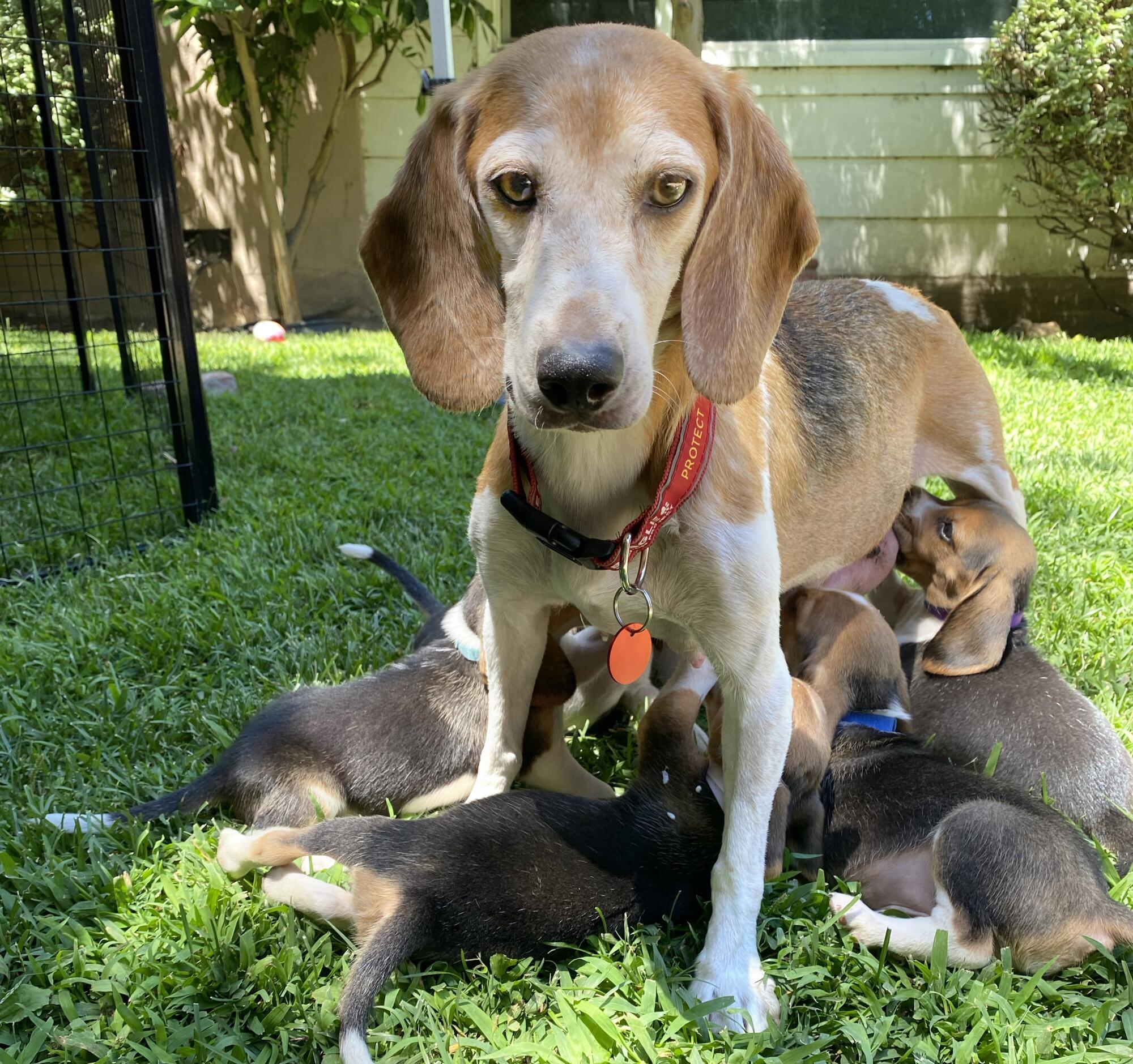
They played in the backyard with Mia, who had been transported with eight of her newborn puppies from Maryland, where the dogs had been taken after the Virginia rescue, to Valley Village. But they did not want a puppy.
“The duchess is holding Mia and was like, ‘We’re adopting her,’” Keith said. “She was like ‘No, we don’t want a Christmas puppy. … We want ones we can help who are older.’”
Meghan has had a rescue beagle for many years, and when she saw the story about Envigo’s shutdown, she wanted to get involved, her spokeswoman told The Times. She knew puppies usually are easier to find homes for and wanted to help one of the older, more vulnerable canines.
The horrifying conditions at an Envigo beagle breeding facility in Virginia raise big questions about the ethics of animal research.
Mia’s storybook ending followed a life at the Envigo plant described by the Department of Justice as a house of horrors. In a lawsuit filed in federal court against the company in May, authorities say beagles were euthanized or left for dead by a meager staff that routinely violated the Animal Welfare Act.
Investigators visiting the facility on numerous occasions in 2021 and 2022 found nightmarish conditions, including beagles with severe and untreated medical issues, insufficient food and housed in filthy conditions. The dogs were sometimes being fed moldy food, and on two occasions, inspectors found live maggots in their food, prosecutors said.
Some animals had been euthanized without first receiving anesthesia, and hundreds were found dead at the facility, according to inspectors. In addition to the euthanized dogs, investigators discovered that 300 canines died at the plant over a seven-month period from “unknown causes.”
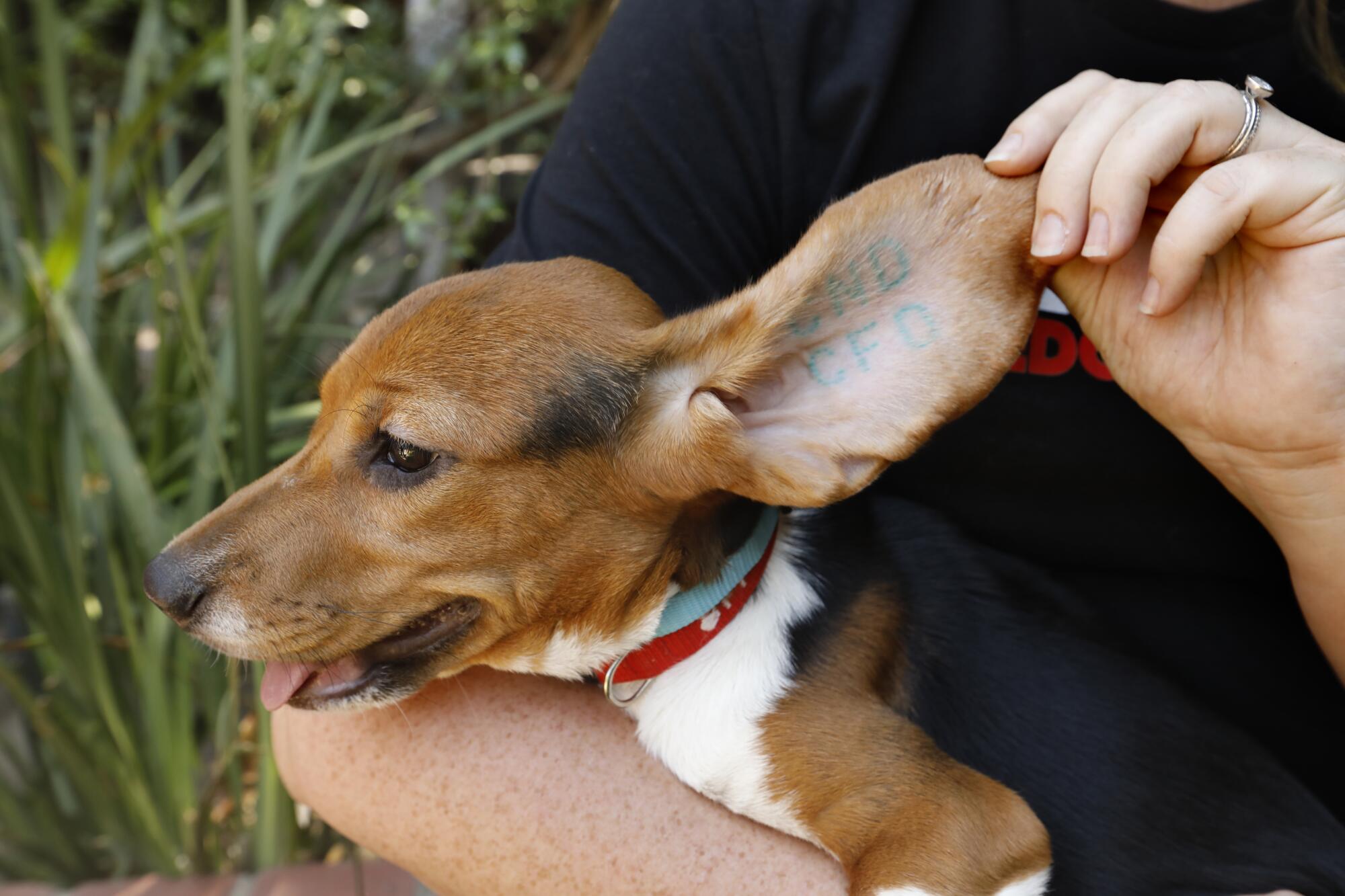
Envigo, the second-largest producer of dogs for medical research, breeds roughly 25% of the beagles used in medical and drug research in the U.S. The company, purchased in November 2021 by Inotiv — an animal testing firm that also has come under scrutiny — has not denied allegations of noncompliance with the Animal Welfare Act.
“There is actually very little that should remain in dispute in this case,” lawyers for Envigo said in court papers, adding that officials spent millions of dollars in the last year working to improve the facility. Envigo’s parent company, Inotiv, said it installed 1,200 new aluminum doors, upgraded and closed in flooring gaps, and installed cooling towers in the buildings.
L.A.’s animal services agency is understaffed and relies on volunteers. At one overcrowded shelter, dogs sit in kennels for weeks or months without being walked.
But Keith said that for all the upgrades to the facility, the beagles were still being abused.
“Basically, it’s a breeding prison,” she said of the Virginia plant. “Not only were the issues not corrected after inspectors went, but they were getting worse.”
After the lawsuit was filed, Envigo agreed to release 4,000 beagles from the plant and shut down operations. The federal government and the company agreed to transfer the dogs to the Humane Society of the United States.
The beagles are being moved to shelters or groups such as the Beagle Freedom Project, which places the dogs in foster homes for rehabilitation before finding their forever homes.
- Share via
The Beagle Freedom Project has taken in 25 of 4,000 beagles rescued from the Envigo breeding and research plant in Virginia, which was closed by federal officials due to overcrowded and unsanitary conditions.
Hundreds of beagles have made their way to Southern California.
Priceless Pets, which has been working with Envigo and the Humane Society, has taken in nearly 1,000 beagles from the Virginia plant.
Ashlee Sprague, who runs the Chino Hills no-kill shelter, said she had been to the Envigo facility and said she’s seen worse treatment of dogs at shelters in California.
Although she was not authorized to give details about the out-of-state plant, she said it was no way for the beagles to live.
People who want to relinquish their dogs or cats must have an appointment. Shelter workers then assess whether they can help the pet stay with its owner.
She also said the rescued beagles represent only a fraction of all dogs that need adopting.
“The beagle mission is like a tiny little drop in the bucket of our organization,” she said. “We’re in this for the animals, and being able to save those dogs from being euthanized is truly remarkable.
“But I’m just so thankful for the attention because through all this ... we’ve been able to get so many other dogs adopted, and that’s remarkable,” Sprague said.
The Beagle Freedom Project has taken in 25 of the rescued beagles. The puppies yipped and bit at one another, played with toys and doused their feet in a water bowl in the backyard of Keith’s home Monday as a few foster parents milled about.
Mia’s 7-week-old puppies scrambled around the yard and between the legs of Keith’s massive but mindful Great Dane, Maya. The eight pups were apparently unaware their mother had recently been crowned Dog Duchess of Montecito.
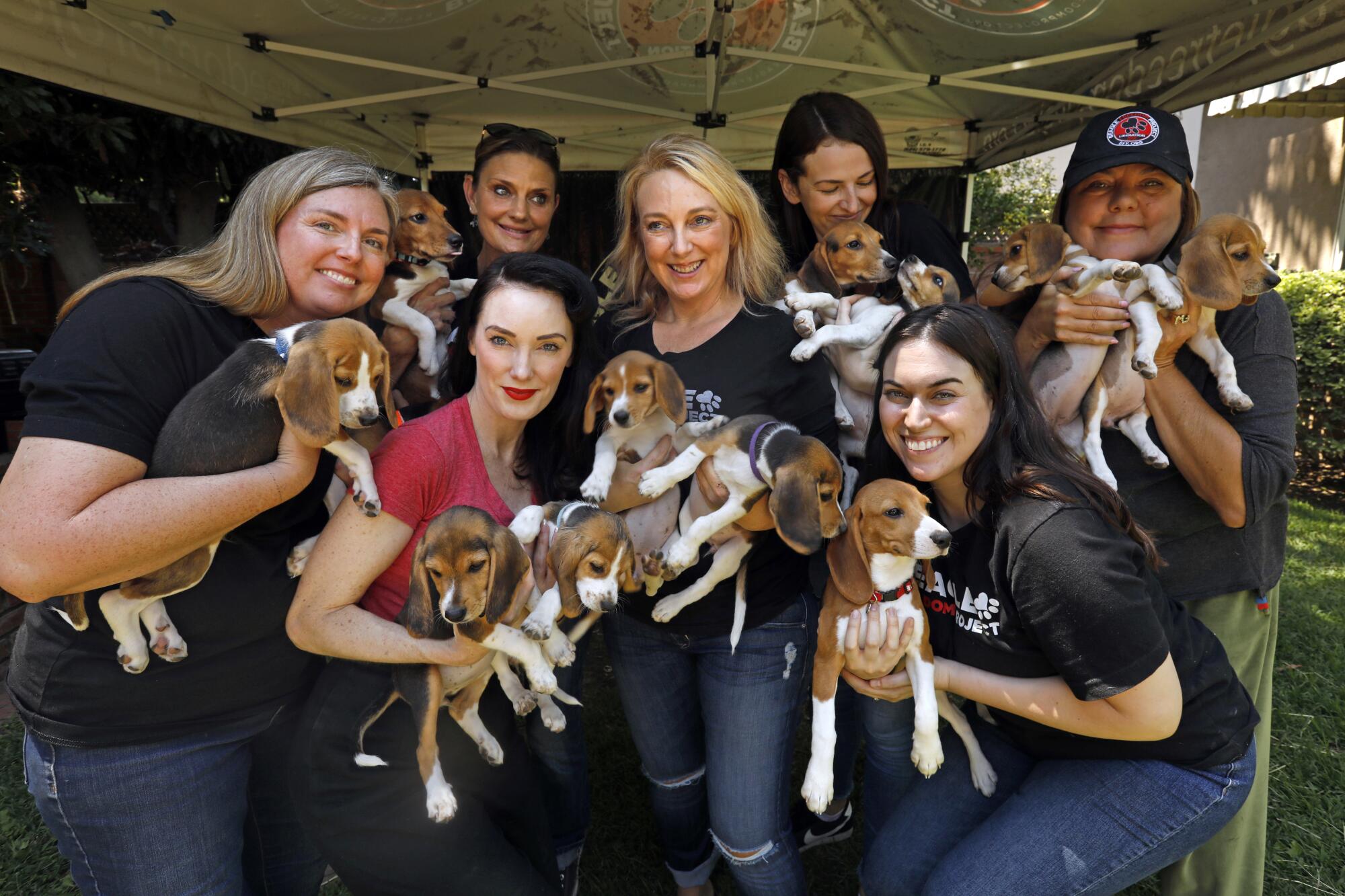
Five older puppies joined the mix in the yard. They’d been trucked from Cumberland, Va., to the Atlanta Humane Society, where Beagle Freedom Project transporter Malina Shirley scooped them up and drove them to Los Angeles.
The older puppies had Envigo’s green, six-letter serial numbers tattooed on the insides of their ears. The youngest pups weren’t marked because they were born too close to the plant’s shutdown, Keith said.
With about 1,000 people on the waitlist to adopt the beagles, Keith expects her nonprofit should have no trouble finding homes for the Virginia rescues.
But she is focused on finding the perfect home for each one, a special match between owner and dog.
As the Duke and Duchess prepared to leave the Valley Village house with the newest, four-legged member of the House of Windsor, Harry paused, Keith said.
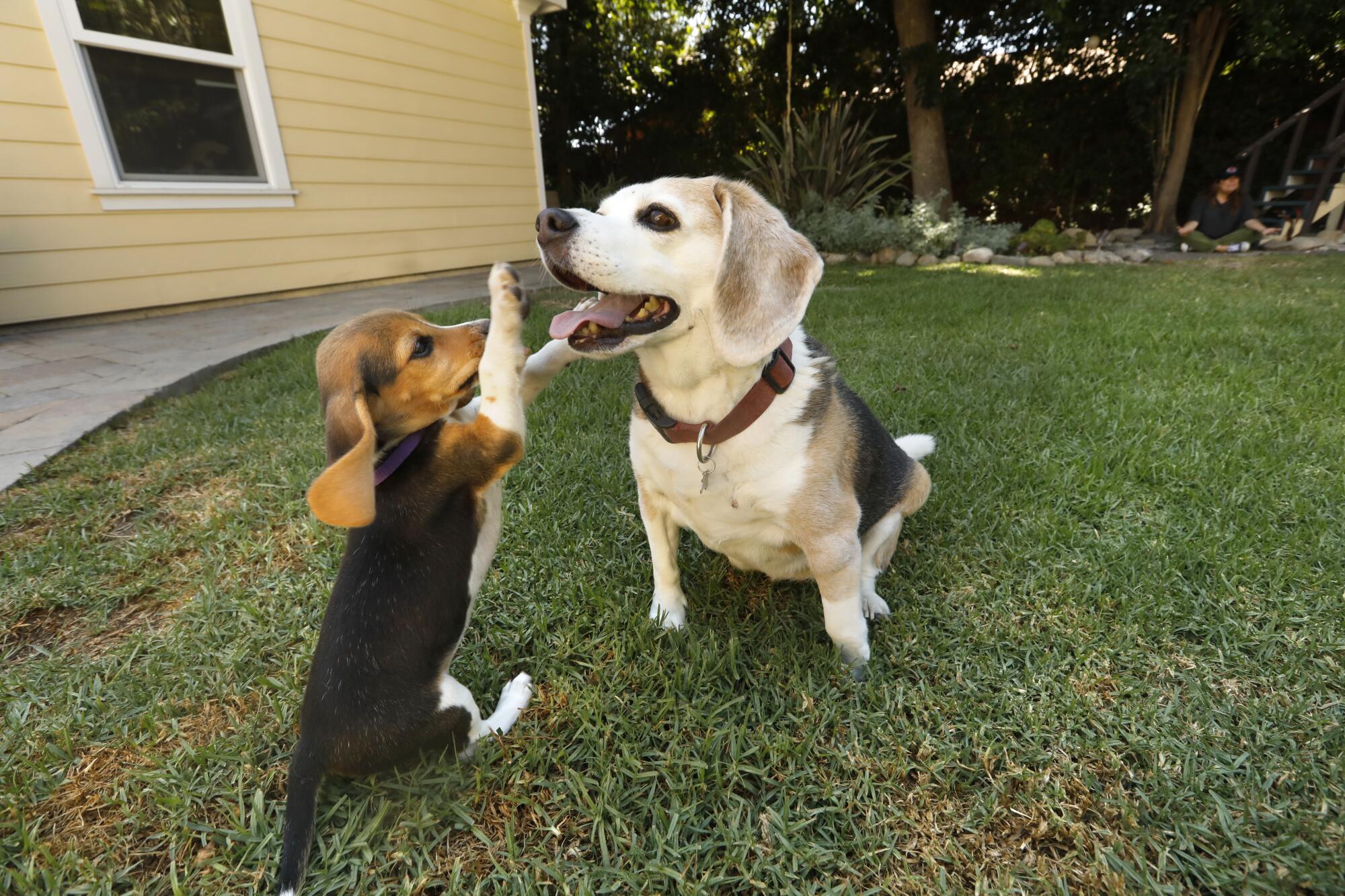
“He’s just like, ‘Well, we can’t leave yet because there’s something in that back house she needs. Does she have a favorite toy or something?’” Keith said.
The royals made their way back and found a box filled with toys. They flipped it over, and Mia grabbed a fox toy she had played with during her cross-country trip from Maryland after leaving Envigo.
And with that, the Duke, the Duchess and their dog left the Valley. “OK, now we can go home,” Harry said.
More to Read
Sign up for Essential California
The most important California stories and recommendations in your inbox every morning.
You may occasionally receive promotional content from the Los Angeles Times.

